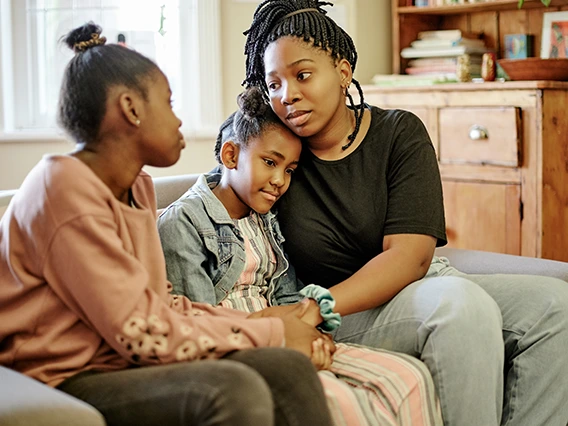
The decision is final; you and your partner filed for a divorce. It took you a while to decide, and now everyone in the family will experience inevitable changes. Sometimes we forget that divorce is a process, not a short-term event, and the following period of change will demand new adjustments for you and your children.
Each divorce carries its own needs, challenges, and approaches. Each family member will experience similar emotions but from different perspectives or points of view. You will negotiate the terms with your lawyers, but you also need to remember to care for yourself and your emotional health. Benefits-eligible employees of the University of Arizona (and members of their household) may contact ComPsych for free counseling or explore the resources available on Credible Mind.
Regarding your children, there are two key things that you must do:
- Reassure them that divorce is not their fault and that you love them.
- Continue co-parenting with your partner while maintaining your children's relationships with both parents.
If your family does not face serious issues such as domestic violence or substance abuse, the best way to ensure that you meet your kids’ needs is by both parents being active in their daily lives. I am not going to lie to you and tell you it will be easy, but it is the best thing for children.
Co-parenting not only helps children feel safe, but it also gives them good modeling on how to solve problems and face challenges. To increase the chances of a successful co-parenting experience, follow the following steps.
- Do not mix feelings and behaviors. Yes, you may be angry and hurt, but your emotions should not dictate your behavior. Release your emotions wisely – exercise, talk to a therapist or a friend – and never vent to your children. Remember that your child’s best interests are your priority.
- Do not put your children in the middle of it. Never use your kids as messengers, and keep the adults’ relationship issues for yourselves. Be careful of your words and do not say negative things about your ex to the children.
- Maintain open communication and answer questions. Do your best to maintain a cordial and respectful attitude. Always answer your children’s questions simply, honestly, and in an age-appropriate manner. Believe me, they will know if you are lying.
- Be a team. Agree with ground rules, routines, and discipline. Even though you do not need to have the same ones in both households, important lifestyle issues, such as homework, curfews, off-limit activities, and screen time, must be similar. Also, where you can, aim for consistency in your children’s daily routines, including bedtime, mealtimes, homework, and extracurricular activities. Discuss and evaluate possible needed changes regularly.
- Make transitions and visitations easier. Moving from one household to another is hard for children. After all, reuniting with one parent involves separating from the other one. Remind them in advance when they go to the other parent’s house. To avoid forgetting important items, help your child create a checklist of what they need to pack, including medications and medical equipment; school materials (books, homework, permissions slips, uniforms, sports equipment, etc.); comfort object; electronics; snacks, or have a set of basics at both houses. Plan to be mindfully present and enjoy downtime together when the child returns to your place.
- Stay informed and updated. Communicate with each other about all medical needs or updates, school progress, schedules, events, financial responsibilities, and any major decisions that need to be made. There are apps available that can help you both stay connected, for example, Our Family Wizard and 2Houses.
- Do not spoil them. Even though the children are having a rough time, you need to continue reinforcing limits, rules, and the consequences of not following them. Also, avoid of the temptation to shower them with gifts when they come to visit you.
Worrying about the effects of a divorce on your children is natural. You may feel remorse, anxiety, and guilt. But remember, it may be better for your children in the long run to have two devoted parents than to live constantly with conflicts and distress in the household.
Good luck!
Related Workshops

Divorced with Children: Successful Co-Parenting Through Family Transition
Divorced with Children Divorce affects the entire family, creating new realities and complex emotions for all members. While you may no longer be a couple, you will always be co-parents. This workshop will help you learn how to communicate the news to your children and develop strategies to navigate this challenging process successfully for everyone involved.
September 23, 2025 - 10-:30 a.m. - 11: 15 a.m.

